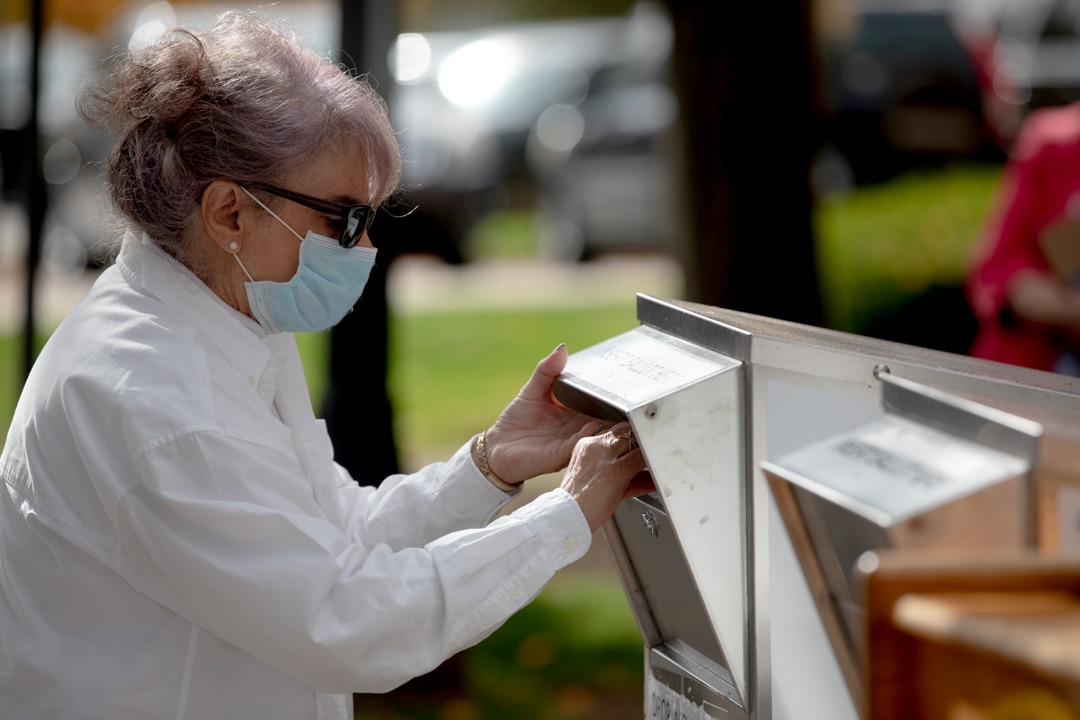Senator alleges voter fraud, but no complaint was filed

Yehyun Kim :: ctmirror.org
A voter casts an absentee ballot during the 2020 election.
During a public hearing Monday on permanently liberalizing the use of absentee ballots — as was temporarily allowed last year due to the COVID-19 pandemic — a state senator alleged that the change produced fraud in his district.
In arguing with Secretary of the State Denise Merrill about the ease of voter fraud, Sen. Rob Sampson, R-Wolcott, said voters in his district were told at the polls that absentee ballots already had been cast in their names.
“First off, it absolutely did happen,” Sampson told Merrill. “I saw several examples in my own election, where voters contacted me and said that they were at the polls, they were attempting to vote, and they were not allowed to vote because their vote had already been cast.”
Merrill sounded incredulous.
“Did they report that to the elections enforcement commission?” she asked.
“My RTC [Republican town committee] chairman and the registrar of voters are both very aware of what happened,” Sampson said.
If that was the case, no voter, registrar or anyone else in his district notified the State Elections Enforcement Commission of the fraud, a felony under state and federal law. In fact, according to a commission spokesman, the agency received no such complaints from anywhere in Connecticut last year.
Sampson, who was participating in the Government Administration and Elections Commission hearing, clarified Monday night that he knows of just one instance of voter fraud in his district during the last election. It occurred when a voter in Prospect showed up at the polls and was told an absentee ballot had already been cast in her name. That individual was eventually allowed to vote, he said.
He did not know why a complaint was not filed about the incident, he said.
The committee’s hearing agenda Monday included two proposed constitutional amendments that would end a constitutional restriction on the use of absentee ballots and a prohibition on early voting.
Connecticut is one of a dozen states without early voting at the polls and only one of three whose state constitutions currently bar it. In 2018, nearly 40 million Americans in 38 states and the District of Columbia went to the polls before election day.
In 2020, the number soared to more than 100 million as voters took precautions against exposure to the coronavirus, either by early voting or voting by mail. In Connecticut, 659,000 people voted by absentee — about 35% of the total, or 10 times the normal amount.
The legislature passed a law last year that temporarily redefined the definition of “sickness” in state voting law to cover a concern about avoiding COVID-19 by giving every voter the ability to vote by absentee.
The Connecticut Constitution says the General Assembly may provide by law the means to vote only in cases of “absence from the city or town of which they are inhabitants or because of sickness, or physical disability or because the tenets of their religion forbid secular activity.”
An implementing law interprets this as a voter actually being ill, as opposed to being concerned with getting ill by being exposed to a virus at the polls.
In 2014, voters in Connecticut rejected what Merrill called a poorly worded amendment — it talked about removing restrictions on absentee ballots and not early voting — by a vote of 491,447 to 453,070. The new question asks, “Shall the Constitution of the State be amended to permit the General Assembly to provide for early voting?”
Amending the constitution is cumbersome. There are two paths to place the question on the ballot, each requiring the General Assembly to adopt a resolution. If the House and Senate approve the resolution by a supermajority of 75%, then the question would go on the next statewide ballot in 2020. If not, an identical resolution must win simple majorities in successive legislative terms, delaying a referendum until 2022.
The early-voting question was approved by simple majorities in 2019, so its approval this year would place the question on the ballot in 2022. Giving the legislature the authority to set absentee-ballot rules by state would go on the 2022 ballot only if passed by a super majority this year.
*** This article has been archived for your research. The original version from The CT Mirror can be found here ***


